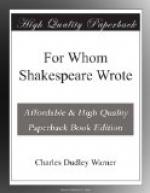It was his fortune to live not only in a dramatic age, but in a transition age, when feudalism was passing away, but while its shows and splendors could still be seriously comprehended. The dignity that doth hedge a king was so far abated that royalty could be put upon the stage as a player’s spectacle; but the reality of kings and queens and court pageantry was not so far past that it did not appeal powerfully to the imaginations of the frequenters of the Globe, the Rose, and the Fortune. They had no such feeling as we have in regard to the pasteboard kings and queens who strut their brief hour before us in anachronic absurdity. But, besides that he wrote in the spirit of his age, Shakespeare wrote in the language and the literary methods of his time. This is not more evident in the contemporary poets than in the chroniclers of that day. They all delighted in ingenuities of phrase, in neat turns and conceits; it was a compliment then to be called a “conceited” writer.
Of all the guides to Shakespeare’s time, there is none more profitable or entertaining than William Harrison, who wrote for Holinshed’s chronicle “The Description of England,” as it fell under his eyes from 1577 to 1587. Harrison’s England is an unfailing mine of information for all the historians of the sixteenth century; and in the edition published by the New Shakespeare Society, and edited, with a wealth of notes and contemporary references, by Mr. Frederick J. Furnivall, it is a new revelation of Shakespeare’s England to the general reader.
Harrison himself is an interesting character, and trustworthy above the general race of chroniclers. He was born in 1534, or, to use his exactness of statement, “upon the 18th of April, hora ii, minut 4, Secunde 56, at London, in Cordwainer streete, otherwise called bowe-lane.” This year was also remarkable as that in which “King Henry 8 polleth his head; after whom his household and nobility, with the rest of his subjects do the like.” It was the year before Anne Boleyn, haled away to the Tower, accused, condemned, and executed in the space of fourteen days, “with sigheing teares” said to the rough Duke of Norfolk, “Hither I came once my




